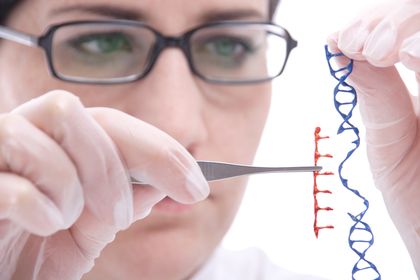As genetics allows us to turn the tide on human disease, it's also granting the power to engineer desirable traits into humans. What limits should we create as this technology develops?
Stem cells have generated such an enormous amount of interest, in part, because of their applications related to areas such as fertility and genetics. In that same light, their interest for solving reproductive challenges has also generated a great deal of controversy. This is particularly true in the application of stem cells to facilitate reproduction for gay couples.
At present, there are a number of research laboratories that are focused on the creation of cells that are genetically male but have been produced from eggs. Alternately, they are also trying to create sperm from female eggs. If the research proves to work, the consequences are particularly important for gay and lesbian couples that wish to have children. The idea is, however, an extremely controversial one that mixes in with politics, religion and ethics. Many individuals oppose same-sex reproduction while gay and lesbian couples - as well as heterosexual members of the public - argue that gay persons should have the right to produce and raise biological children if the opportunity becomes available.
Current Research for Same Sex Reproduction
The techniques purported to allow same-sex reproduction have yet to be successful but they do hold promise. They include methods of cellular reprogramming and even techniques such as artificial chromosomes. While they have not been shown to work at present, they do hold potential for the future of same-sex reproduction. One particular technique involves the creation of sperm from human stem cells. In a recent experiment, bone marrow stem cells were extracted from men and they were then triggered into spermatogonia. These cells are able to develop into immature sperm cells. The experiment was widely reported in the news but has not yet been published or successfully replicated.Current Research for Same Sex Reproduction
The techniques purported to allow same-sex reproduction have yet to be successful but they do hold promise. They include methods of cellular reprogramming and even techniques such as artificial chromosomes. While they have not been shown to work at present, they do hold potential for the future of same-sex reproduction. One particular technique involves the creation of sperm from human stem cells. In a recent experiment, bone marrow stem cells were extracted from men and they were then triggered into spermatogonia. These cells are able to develop into immature sperm cells. The experiment was widely reported in the news but has not yet been published or successfully replicatedn another experiment, spermatogonia were triggered to begin meiosis after being cultured with cells known as Sertoli cells. These cells are found in the testes and are important because they support developing sperm. While the research team for this particular experiment has yet to obtain these kinds of results with the production of eggs, a team in Brazil does cite that they have created sperm and eggs from embryonic stem cells. Whether or not the eggs can actually produce viable offspring, however, is the most vital aspect of this type of experimentation. Still, the work does still show that potential for same-sex reproduction exists, and it will likely spur further research in this area.
Safety Concerns
Safety is a key aspect of stem cell research - this aspect is more important than ever when addressing the potential for same-sex reproduction. When cells are triggered into change, there is the possibility that they grow uncontrolled and are more likely to lead to cancer. The enormity of the cell modification that occurs to create female sperm is also of concern, especially with regards to any chromosomal abnormalities or problems that can occur through the use of artificial chromosomes.Controversy of Stem Cells and Same Sex Reproduction
Unfortunately, the pathway to realistically providing the techniques to support same-sex reproduction is a complicated one in terms of political, religious and ethical controversy. Most conservative religious groups are strongly opposed to same-sex relationships, so it follows without surprise that they are against same-sex reproduction. This means that even if same-sex reproduction becomes a successful reality, there are still numerous hurdles to overcome before the techniques can actually be put into practice.http://www.explorestemcells.co.uk/stem-cells-same-sex-reproduction.html

No comments:
Post a Comment